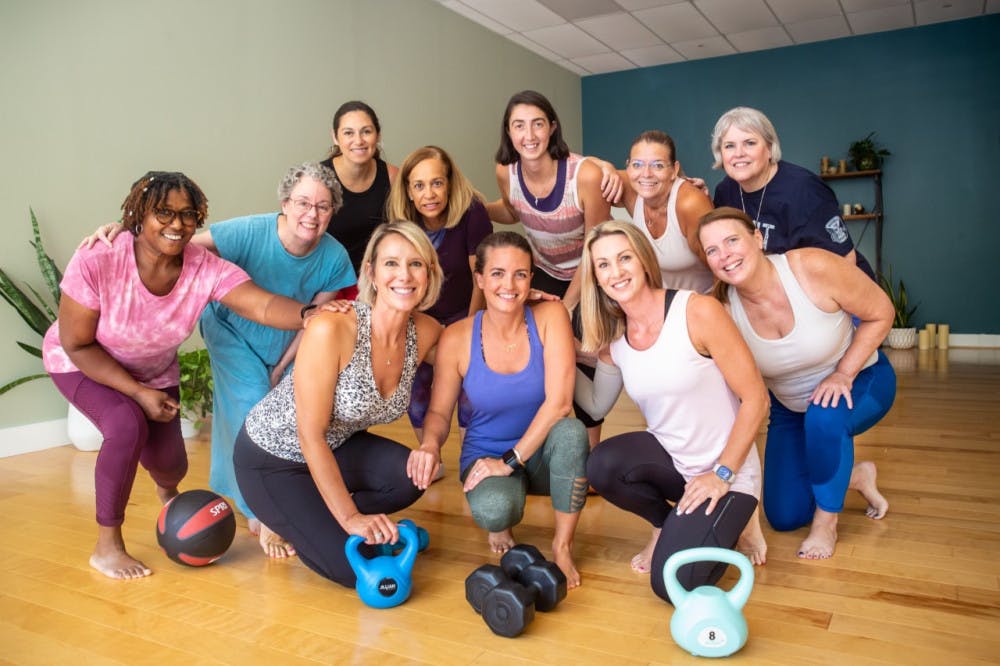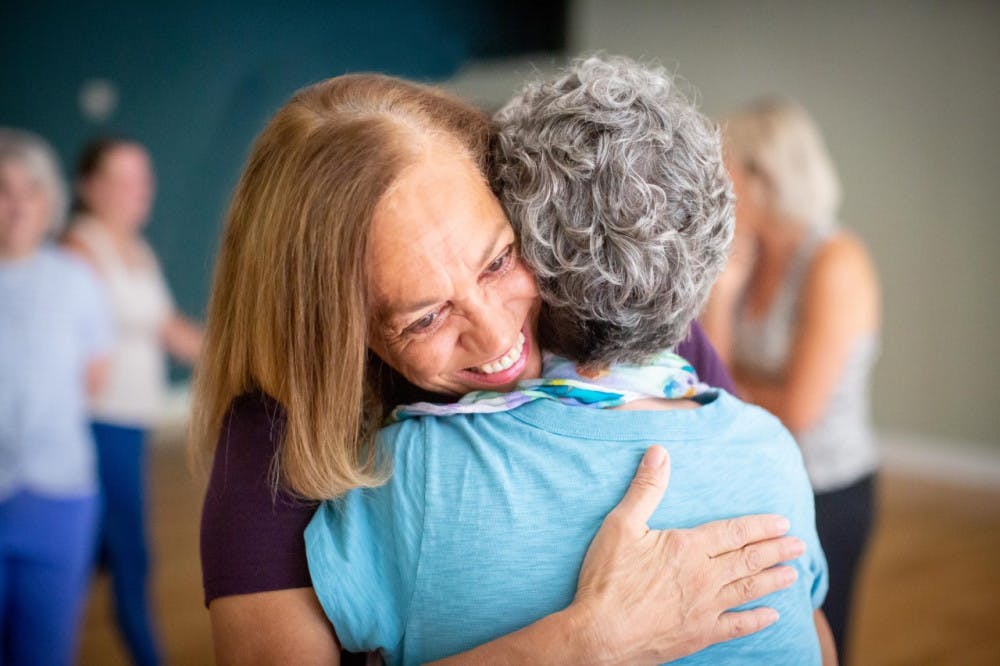Nonprofit organization provides community for breast cancer survivors who meet in Gordon JCC

Members of Breast Cancer Recovery in Action meet at 11 locations, including at the Gordon Jewish Community Center.
After Mary Dono underwent a mastectomy and lumpectomy, she felt she had nowhere to turn for mental health services related to her breast cancer.
Dono, 73, said a mammogram in January 2022 showed a “suspicious” growth on one breast, confirmed to be cancer two weeks later. She had two surgeries that May. Dono talked to a neighbor who worked as an OB-GYN about some of her medical tests, but said she had little guidance about how to proceed beyond the medical aspect of breast cancer.
“ …Once you’ve gone through the launchpad to surgery, once you’ve had the treatment — whatever it is that they do for you — it’s kind of over, but breast cancer involves a lot more than just having a cancer or having a problem,” said Dono. “The medical community kind of drops you. I even had to ask my oncologist what they do for mental health; it was never even offered to me.”
She found community through Breast cancer Recovery in Action, a nonprofit organization in Tennessee, and has been involved for nearly a year. Run by breast cancer survivors, BRA is a program aimed to help other survivors recover and navigate their post-diagnosis worlds.They meet regularly in the Gordon Jewish Community Center.

Nancy Brown, co-founder of BRA, said the program is divided into four core components: emotional wellness, nutritional health, exercise, and education. Each is specifically geared toward people in treatment for, in recovery from, or living long term with breast cancer. The nine-week emotional wellness component is a small group setting of at least five survivors.
“The thing that surprises the most people that they love the most is our small group,” said Brown, who founded BRA in October 2021. “We use a curriculum called ‘journey to wholeness’ and it talks about that basically all humans have eight feelings and they’re neither good nor bad. After a diagnosis, it’s very common to go through all of the stages of grief, so we talk about the loss and the sadness and the anger and all of the different things. We talk about body image and what we find is that everyone brings their own life story to their diagnosis… and so we talk about those life stories.”
Dono’s neighbor said her childhood best friend was a breast cancer survivor and member of BRA. She encouraged Dono to talk to her friend, but Dono was hesitant to open up about such a personal aspect of her life.
“I never really got to the point where I felt I wanted to talk to a stranger,” said Dono. “It’s just kind of hard.”
Dono took the leap of faith and picked up the phone. After a heart-to-heart conversation with one of the co-founders, she decided to join BRA.
“Sometime within those nine weeks — I don't remember exactly — I had lost that freaked out feeling I had from [my] diagnosis and started to feel a little bit more calm,” said Dono. “ …This was the safe space I needed.”
Finding a support system
Members not only have the opportunity to talk through their emotions openly, but also form a bond with fellow survivors.
“It’s wonderful when you have a great family and community support system, but nobody really understands what it’s like unless they’ve walked in those shoes,” said Brown. “When you have a community of survivors — people who have actually heard those words, ‘You have cancer’ and understand that it can be a life-threatening event — it just forms a community that’s not like any other.”
The Jewish Observer is published by The Jewish Federation of Greater Nashville and made possible by funds raised in the Jewish Federation Annual Campaign. Become a supporter today.
Support systems look different for everyone. When Dono was first diagnosed with breast cancer in February 2022, her operating team told her to get her support team together.
“‘Who’s that?’ Well it’s your surgeon and your surgeon’s nurse and your oncologist and all the team members who do all the testing, and then you’ve got your family and you’ve got your friends, you’ve got your relatives,” said Dono. “I said to the group, ‘I’m just amazed. I’ve told so many people I have cancer; I haven’t heard from most of them.’ It’s like I was a non-person now.”
She said that sentiment was echoed by “all” the others in the group, including one member whose sister will not talk to her about cancer.
“I think, really, that the human condition is that people just want to be heard and seen and to be listened to,” said Brown. “We do that by sitting in a small group or one-on-one with someone and saying, ‘You are valid. You are worthy and however you feel is how you feel.’”
Staying active in recovery
Regular exercise is proven to reduce risk, recurrence, and mortality of breast cancer, per the American Institute for Cancer Research.
Brown said all of the athletic trainers at BRA have a Pink Ribbon certification in breast cancer exercise recovery. “Each person works to their ability,” said Brown. “So, we might have somebody who is doing stretches, range of motion exercises with no weight at all. We might have somebody else who has progressed to doing some light weight. Other people may already be able to use heavier weights.”
She added that members meet regularly in the JCC’s group fitness room and wellness room, where they use weight machines, dumbbells, resistance bands, or their own body weight for core exercises.
Dono said she takes a hormone replacement medication that removes the estrogen from her body as part of her cancer treatment. The medicine brought back menopausal symptoms and reduced the cushioning around her joints, which makes some movement difficult for her.
“Some days one knee hurts; some days both knees hurt,” said Dono. “Some days one hip hurts; some days both hips hurt. Some days it’s one hip and one knee. Some days it’s all. The thing that I find the most difficult to do is a lunge.”
She said when the group was doing a set of lunges, one of the trainers showed Dono an alternative exercise she could do using a chair. The movement targeted the same muscles without the pain, Dono said. She exercises with a trainer twice a week and knows she would be welcome every single day if she so chose.
Looking to the future Brown said she hopes to expand BRA beyond its current 11 locations and find corporate sponsors to help with this growth.
“We want to be as many places as we can possibly be,” said Brown, adding that she requests donations, but there is no membership fee to join BRA. “You know, we kind of just jumped into this with a hope and a prayer with no funding.”
She said she also wants to help increase access to information about breast cancer and breast cancer recovery beyond the metropolitan Nashville area.
“One of our biggest goals was to take it further and to go into more rural areas to serve more…” said Brown. “I have some very good friends who are [of] Ashkenazi Jewish descent and so I know that there’s a big need for something like that within the Jewish community, so we worked together to bring it to the JCC. But then, African American women have a really high incidence of breast cancer and they’re usually diagnosed at a later stage, so we want to work with those people and get out into more rural areas where people don’t have access to the things that you would find in a larger city.”
Increasing access to BRA will unite many more survivors like Dono.
“I’m so thankful that we have Breast cancer Recovery in Action because there really [aren’t] a whole lot of programs like this to choose from,” said Dono. “It’s very important. Like I said, it picks up where medical care is lacking — where they fail or where they let you go or drop you or just move on to your every six months or every year [checkups]. It fills in the gaps to that and they are always there for you."
For more information about Breast Cancer Recovery in Action, email info@bragroups.com, or visit www.bragroups.org

